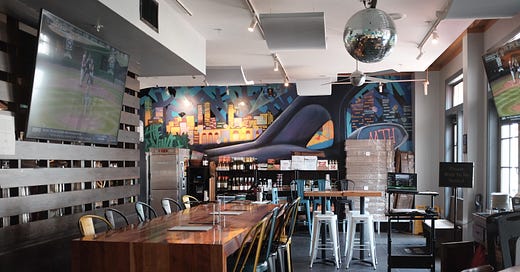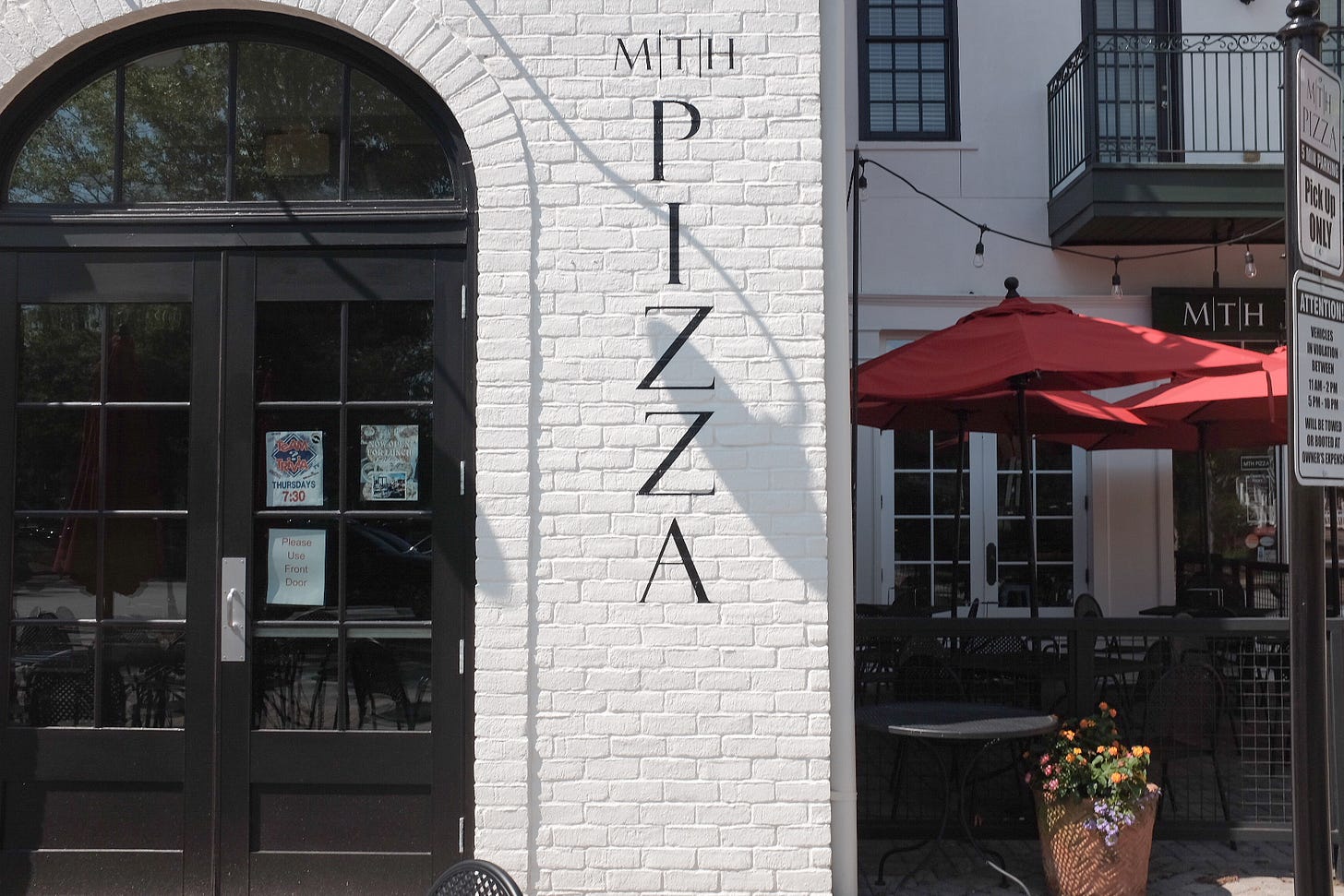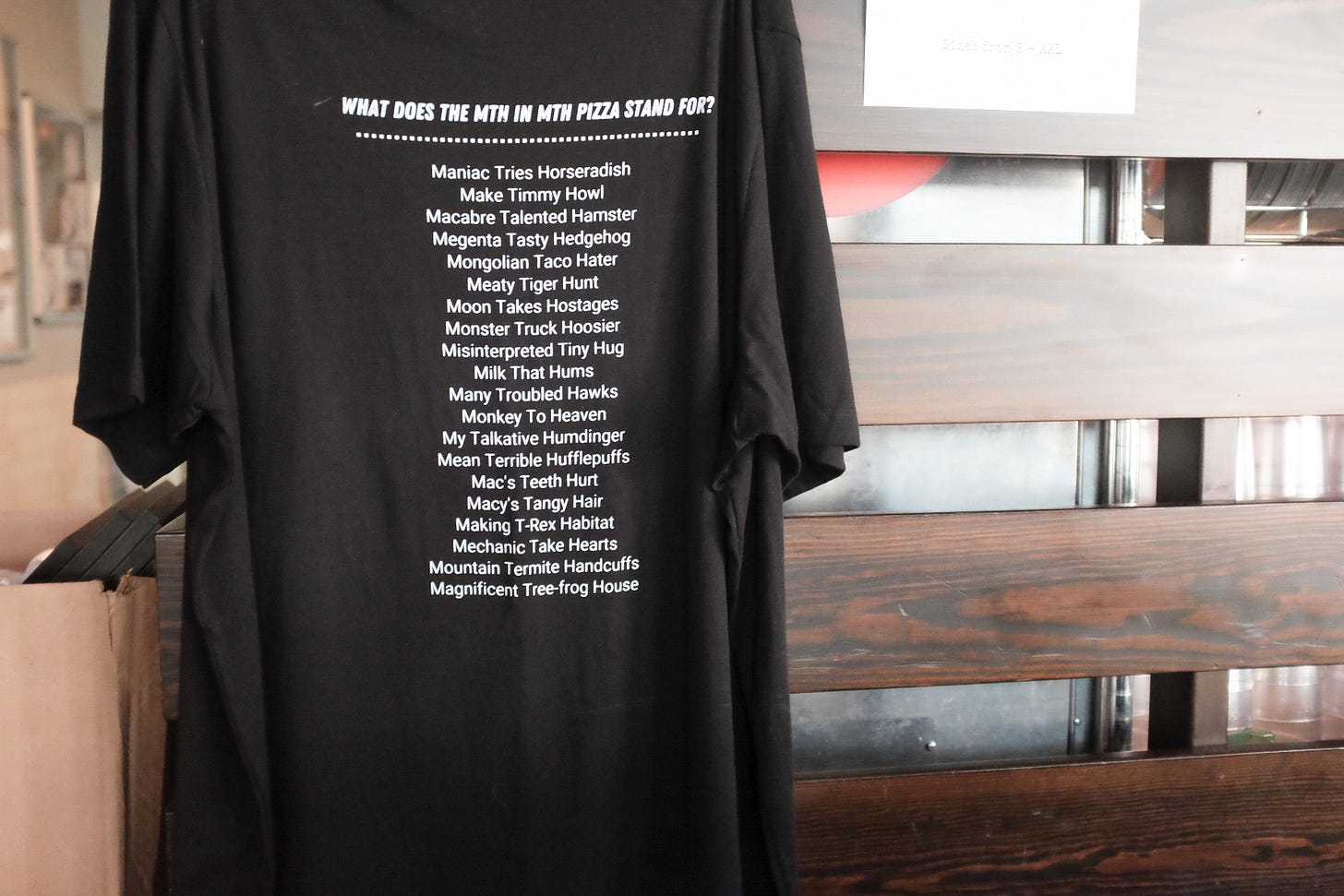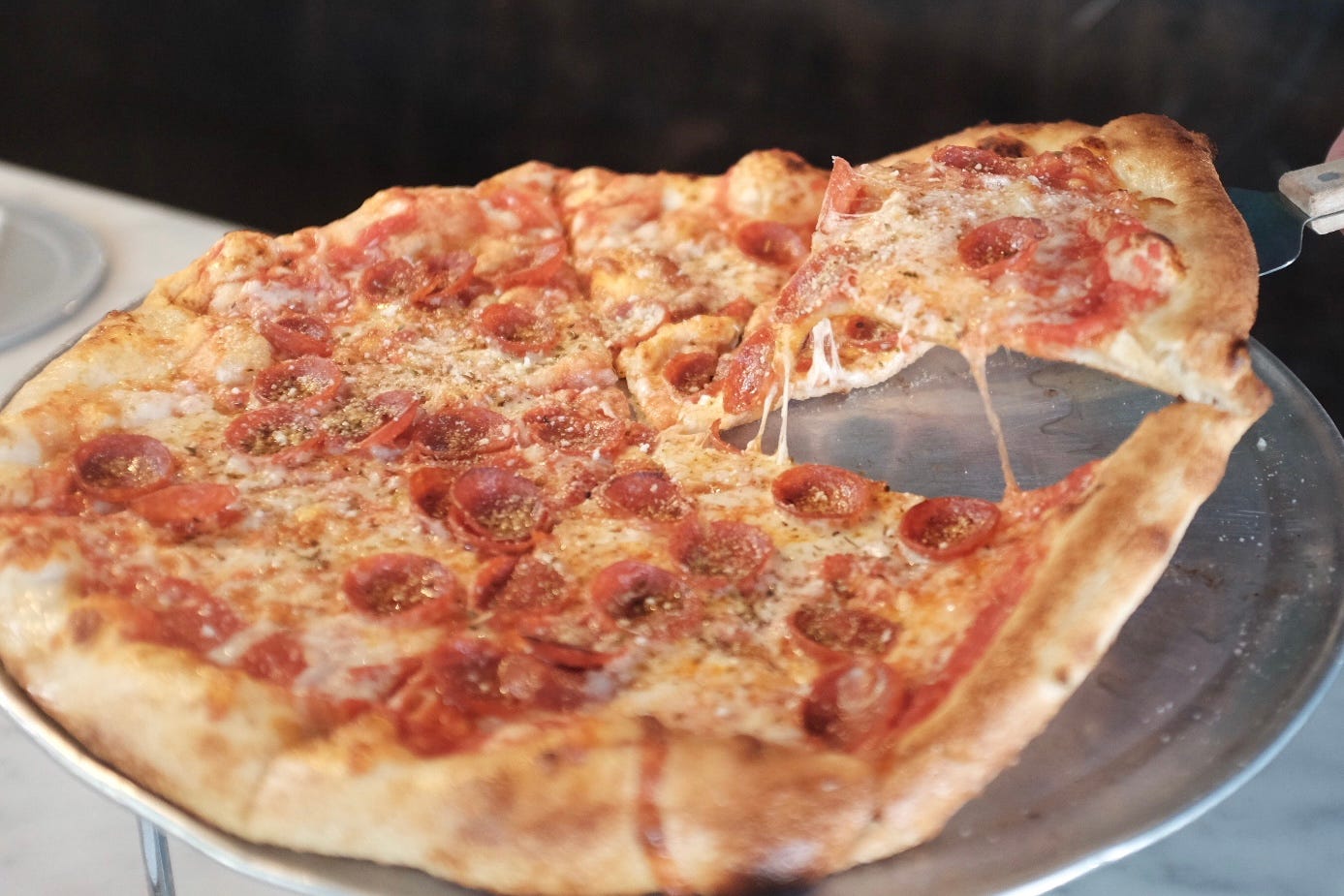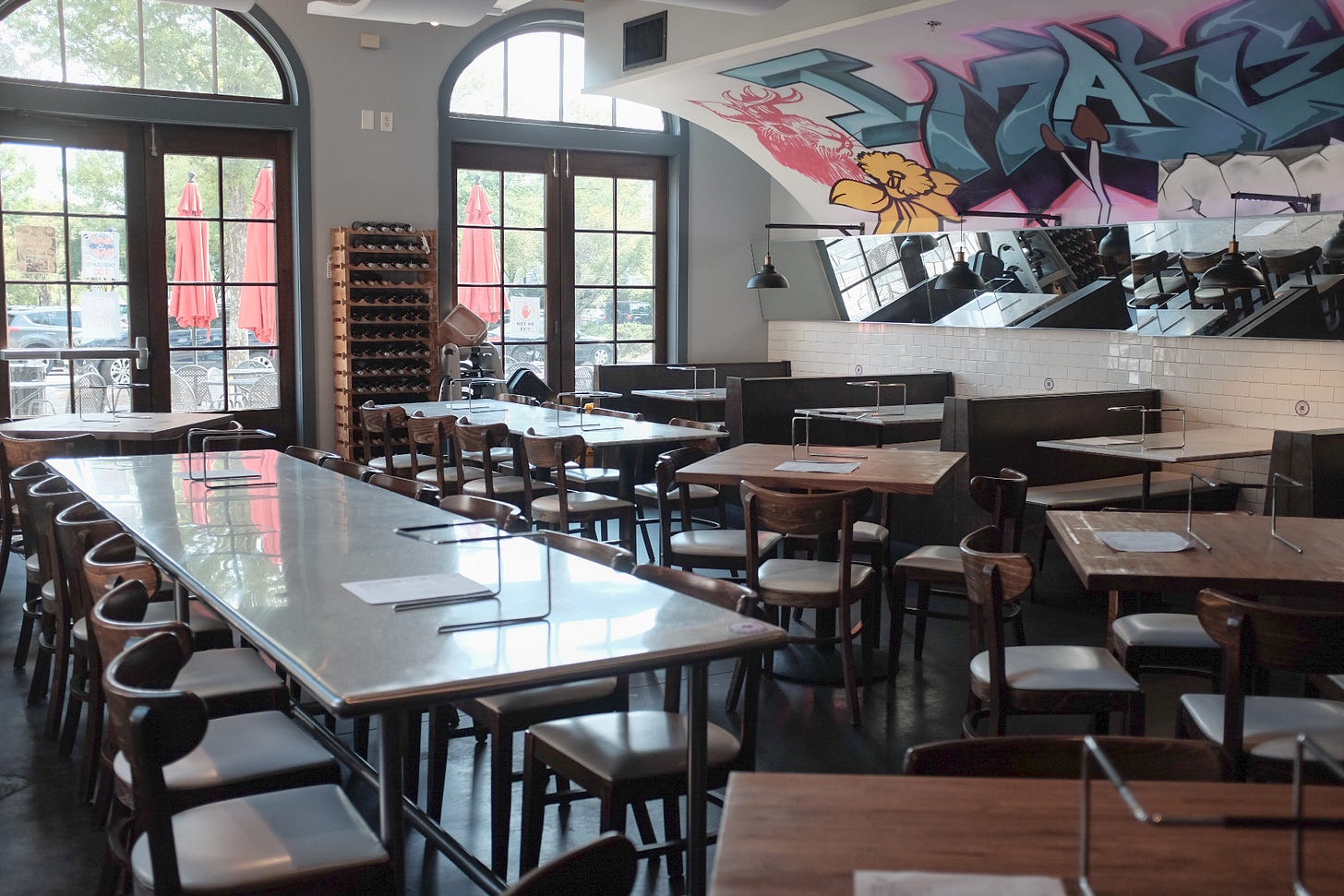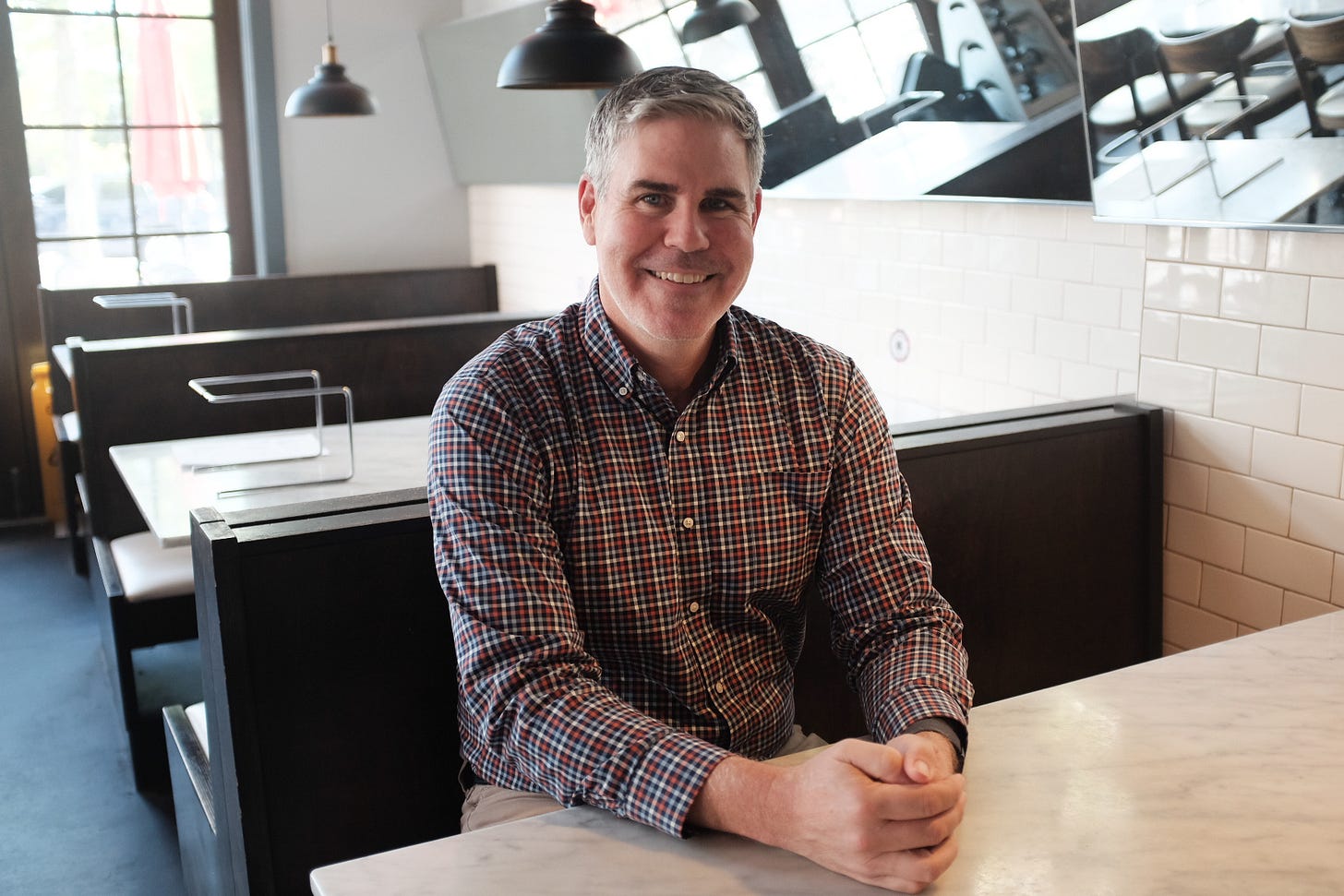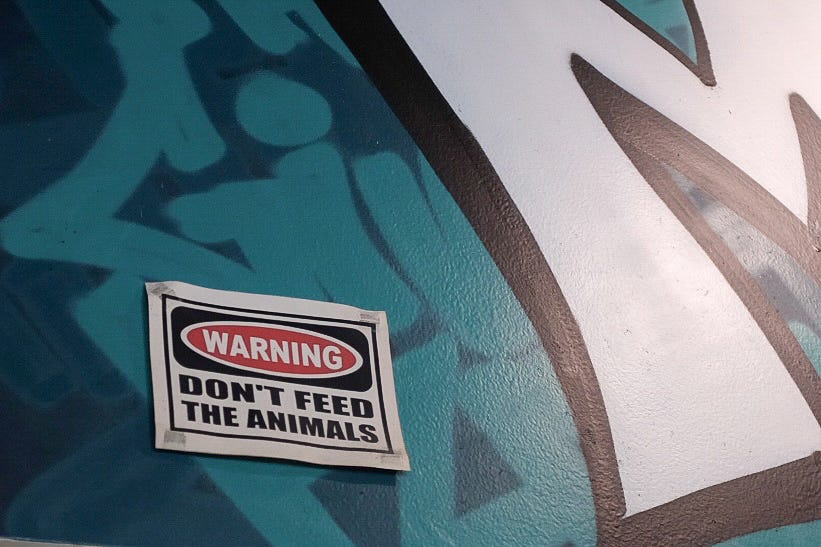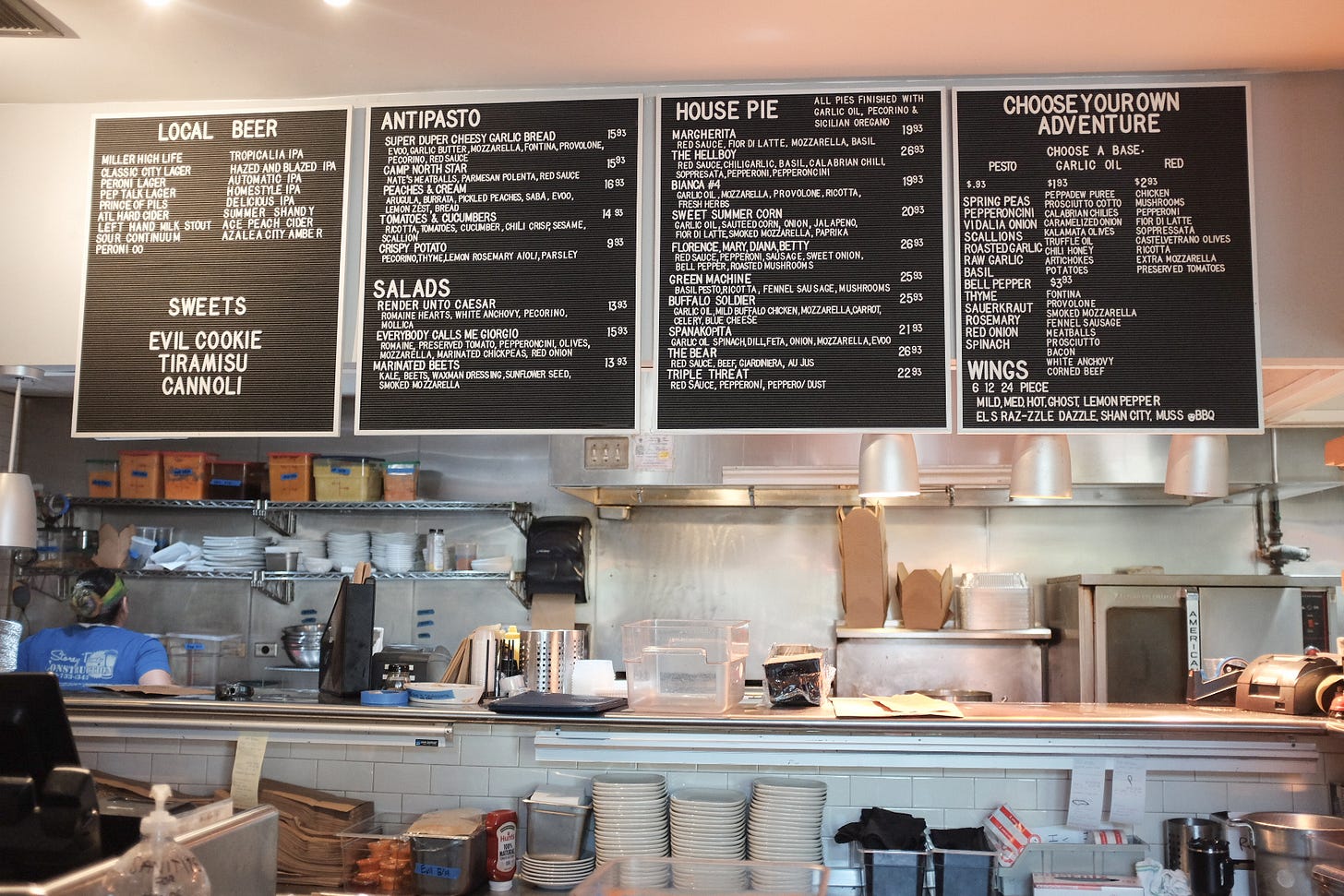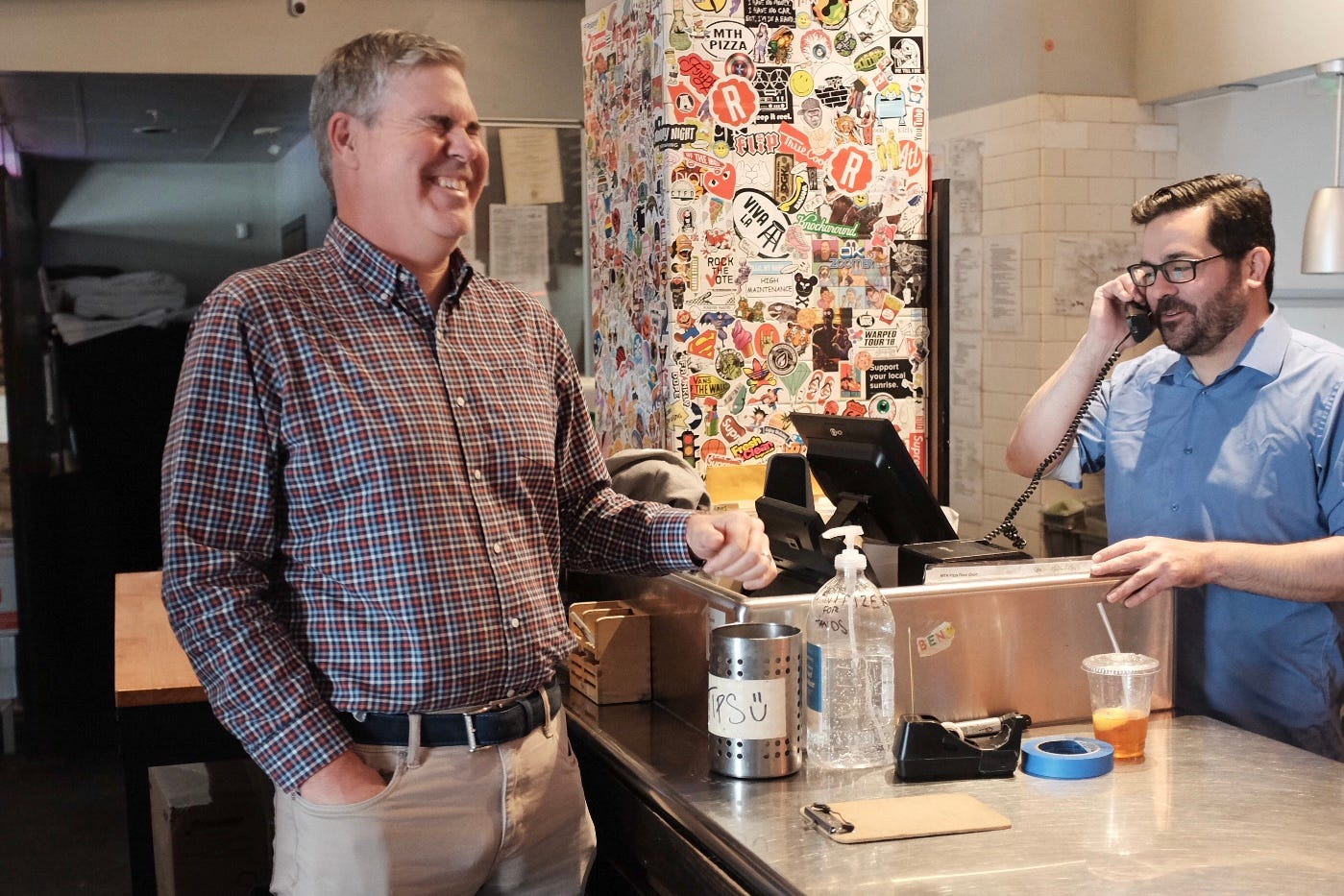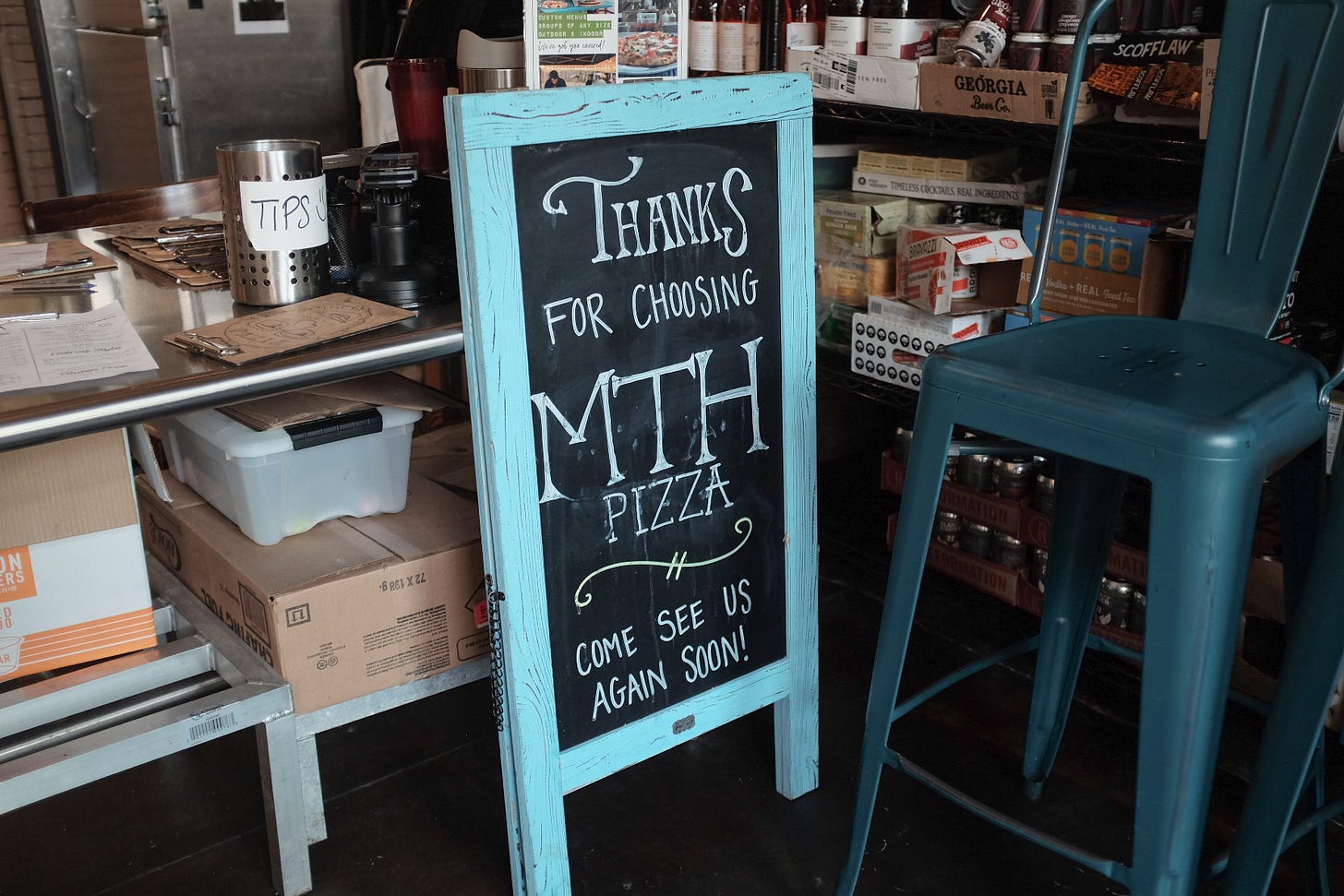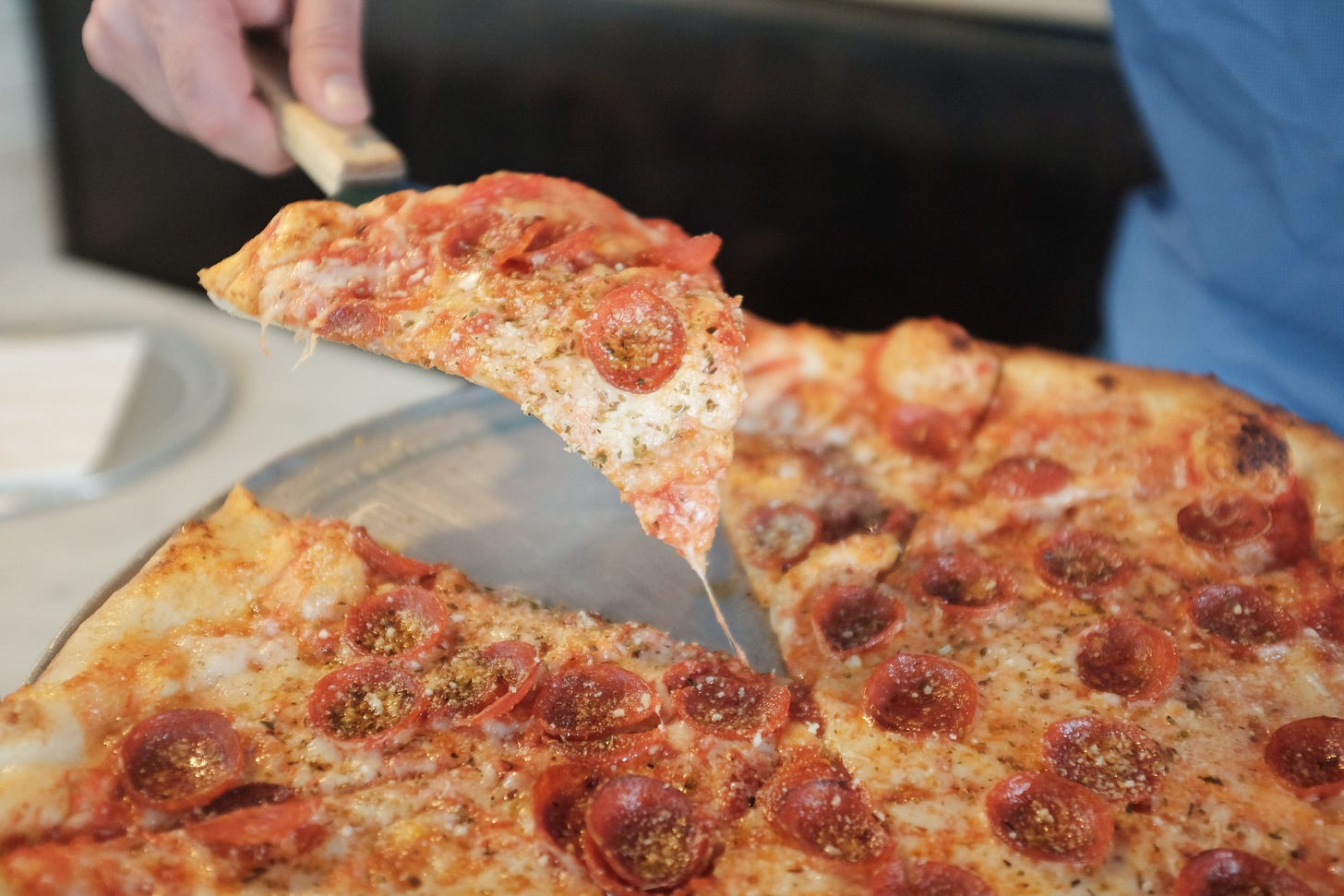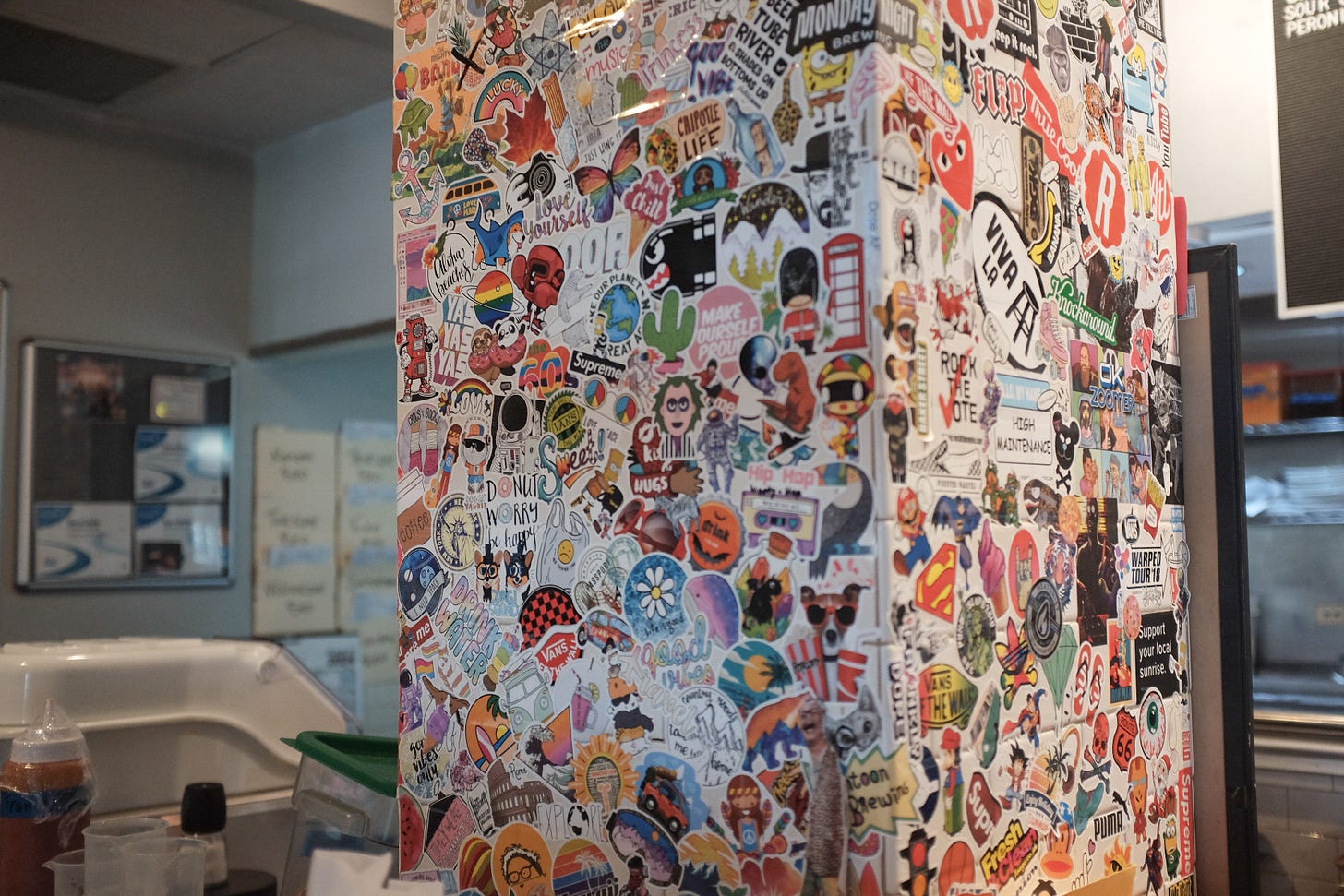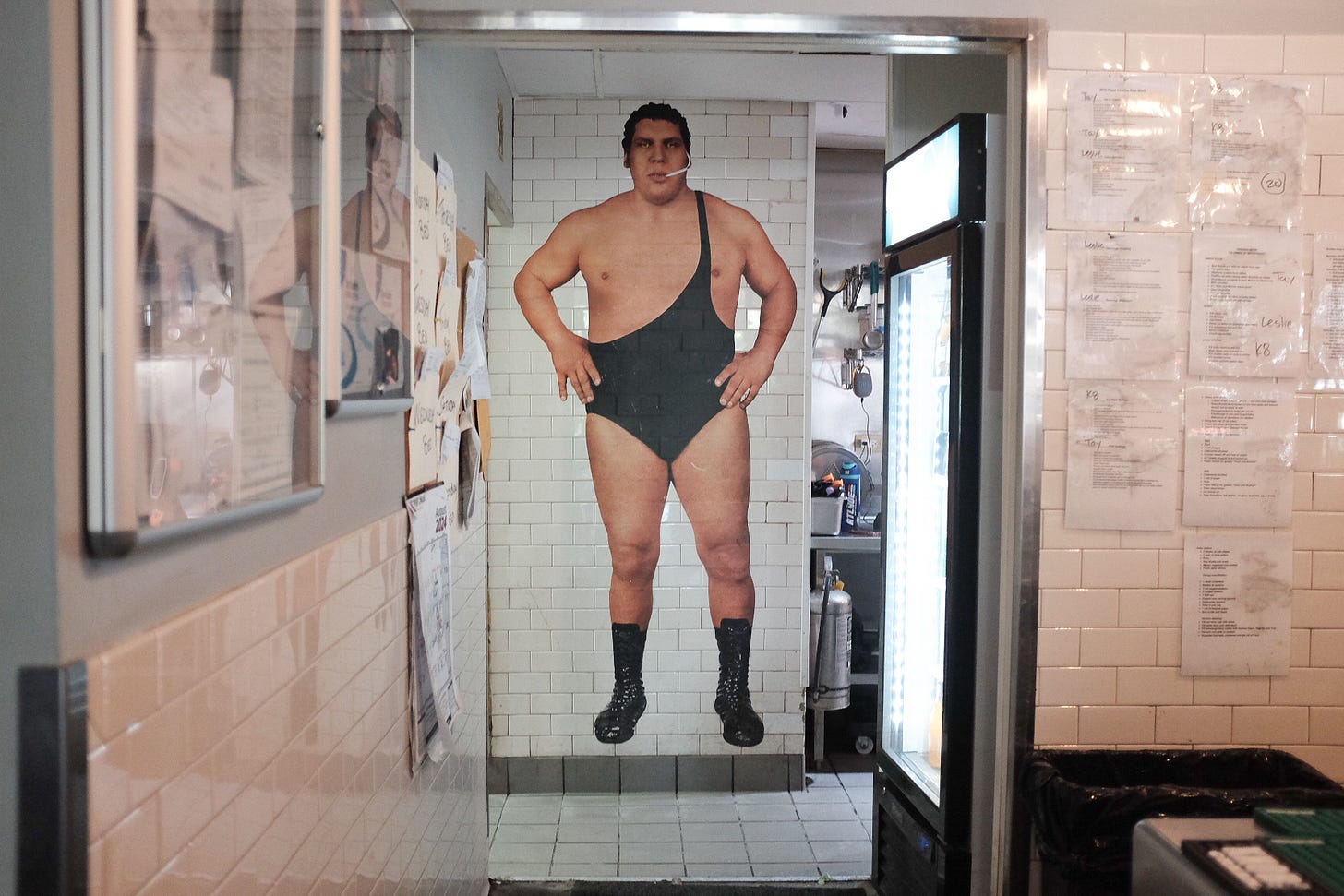From New York, to Detroit, to Chicago, Neapolitan, Sicilian and even Digiorno, pizza is a cultural defining food, no matter how you slice it. It’s one of the few foods that even comes with its own handle (God forbid you use a knife and fork). What makes pizza a pizza? No one really knows to be quite honest. You can put the sauce on top, you can put it on the bottom, you can add a little pepperoni, some hot honey, red pepper, parmesan, garlic, olive oil, or whatever your heart desires. Hell, it even comes in rolls. As long as it’s a mix of bread, cheese, and sauce, you got yourself a pie. Everyone has their favorite kind and will defend it to their grave, but there’s one kind of pizza especially unique and only found in Smyrna, GA called “A La Smyrna” craftily made by a spot called MTH. I sat down with one of their owners, Ryan Turner, to talk about what makes their style so unique.
The Place: MTH Pizza
What’s the story of MTH Pizza?
MTH Pizza stands for Muss, Turner, and Hall. A lot of people get it wrong—they think it's "meth" or "math," which is kind of wild. Muss & Turner's, or "M and T’s" as some call it, was our original spot. When we opened Local Three, Chris Hall joined us as a partner in 2010, so adding the “H” just made sense. We launched MTH Pizza in October 2019, and it’s crazy to think we’re nearing five years already. We took over this old place called Little Azio, which had been around since about 2005, soon after Muss & Turner's first opened. We weren't actively looking for a space, but we always had parking challenges at One Ivy Walk. Little Azio wasn’t bustling, but they had a killer pizza oven. So, we thought, if someone’s going to take over and add parking pressure, it might as well be us.
Chris’s first job was at a Pizza Hut on Collier Road, and he later leveled up to Fellini’s. He’s always had a soft spot for Italian food, as do Muss and I. Pizza, in particular, felt like something we could get really passionate about. Pizza’s everywhere—everyone loves it. Finding bad pizza is tough; finding truly exceptional pizza is even tougher. Muss, our mad scientist, dove headfirst into perfecting dough and pizzas. He’s the kind of chef who, once he’s locked onto something, will figure out how to make it better than anyone’s ever had before. His excitement fueled the rest of us.
We knew the space already had a pizza reputation, and with our existing brand and relationships, we could at least get folks to give us a shot. We signed a 10-year lease, extended our deal at Muss & Turner’s, and doubled down on our commitment to the Smyrna community. My son actually asked me recently, “Dad, do you not like other pizza? All we eat is MTH.” I had to laugh and tell him, “I love other pizza, but I like supporting my own restaurants.” It’s funny—my kids feel almost guilty when they eat someone else’s pizza. That’s how MTH Pizza came to be.
Why Pizza?
Some of our restaurants might be considered higher-end or fine dining, but we never wanted them to feel that way. Muss & Turner’s was founded on challenging that whole idea—that you need to spend two hours and $200 for great food made with love. Muss, Chris, and I all came from fine dining backgrounds, white tablecloths with all the pomp and circumstance. We wanted to break that mold. When we opened Muss & Turner’s, our goal was to take what we knew from fine dining and put it between two slices of well-made bread—something people understand but elevate it. We wanted them to bite into our version of what they thought they knew and just melt their faces off. Pizza, like a great sandwich, is simple. It’s classic, and when it’s done right, it’s incredible. Italian food, in general, is all about simplicity. Great ingredients, no overcomplication. We love casual, unpretentious places, and MTH embodies that. From the disco ball to the music, it’s all about having fun, kicking back, and enjoying a slice with a cold beer. Don’t worry about what you’re wearing, just come in and enjoy what is, truly, a universal delight.
What makes the pizza here unique?
Muss went deep down the rabbit hole with our pizza—he bought cookbooks, scoured the internet, ripped through 50-pound bags of flour. He even bought a Roccbox, this small oven that gets up to 900 degrees, just to test dough. It all starts with the dough. Like with a sandwich, you need great bread. Muss experimented with different flours, fermentation periods—one day, five days, seven days. What he settled on was high-protein flour and a three-day fermentation, which is pretty unique. Not every place even makes their own dough in-house, let alone ferments it for three days. The result? The texture and flavor are unmatched. That extra fermentation breaks down the gluten and gives it a depth you won’t find elsewhere. Muss describes our pizza as “pizza à la Smyrna,” a cross between New York and Neapolitan styles. Once he nailed the dough, he moved on to the sauce. After trying every tomato product on the market, he landed on Tomato Magic—awful label, but as Chris likes to say, you can’t argue with delicious. We just add a little salt and olive oil. High-quality mozzarella, fresh vegetables, great proteins—all on top of a dough built to be special. People taste it and are either blown away because they’ve never had pizza like it or relieved because they’ve been searching for this level of quality. It’s fun to see that reaction. Our wings are right up there with the pizza—Springer Mountain jumbo wings, all-natural. We make our own sauce in-house with real butter, not the fake crap. Our buffalo sauce is spot-on, the lemon pepper is a guest favorite and we even have a Shan City chicken spice rub for those who love Szechuan cuisine.
And then there’s our meatball sub—honestly, maybe my favorite item. We use pizza dough that’s gone past the three-day fermentation mark and turn it into a mini baguette. Meatballs, cheese, garlic butter—it's the best meatball sub I’ve ever had. And I’m a fan of meatball subs, so I don’t say that lightly. We also offer a gluten-free pie, which took us two to three years to perfect. We make that dough in-house, too—none of the frozen stuff. Gluten-intolerant folks freak out when they taste it, saying they can’t believe it’s gluten-free. Because of the fermentation process, the enzymes break the gluten structure down and make the regular dough also gluten friendly. We stumbled into that.
What should someone get their first time here?
Pizza’s personal—everyone has their own litmus test. If you’re trying to judge a place, go for the margherita. It’s the best way to see if we’re legit. And if you’re feeling wings, start with our classic buffalo. We’ve got different heat levels depending on your preference, but keep it simple to start.
What is The Giving Kitchen?
The Giving Kitchen is a nonprofit that Chris, Muss, and I helped found with Ryan and Jen Hidinger, Mike Gallagher (Brick Store Pub, Good Word Brewing & Leon’s Full Service) and Michele Stumpe in 2013. It supports food service workers in need—whether they’re dealing with illness, injury, a natural disaster, or a family crisis. We provide financial assistance to help bridge the gap when they can’t work. We also offer a Stability Network, which connects workers to community resources like substance abuse counseling, furniture donations, and even pro bono surgeries. The Giving Kitchen is now a national organization, helping food service workers all over the country. It started with one of our chefs, Ryan Hidinger, who was diagnosed with stage-four gallbladder cancer at 35. We held a fundraiser for him, raised $275,000, and the energy of that event led to the creation of The Giving Kitchen. We’ve activated Nashville and Charlotte and are expanding to have boots on the ground in Dallas and Chicago. The organization has helped people as far away as Hawaii during the wildfires last year. The most important thing is letting people know we exist. There are 15 million food service workers in the U.S., and many of them don’t know we’re here to help. Every dollar we raise goes towards making sure we can keep up with demand, and the demand is growing.
The Person: Ryan Turner
Who is Ryan Turner?
I’m a 52-year-old guy from a mill town in southern Maine. I grew up middle class, went to school without a clue what I wanted to do, and ended up in the restaurant business. I’ve been married for over 25 years to the love of my life, Shelley. We have two kids—our oldest just started college at UGA, and our son is a freshman in high school. Family has always come first for me. Twenty years ago, when I left my full-time job to start Muss & Turner’s, I had a vision: I wanted to build something that wouldn’t come at the expense of being a good husband and father. I didn’t want to look back with regrets. I’ve always been a bit of a “care-aholic,” putting others’ needs before my own. Hospitality attracts that type of person. I love people, love developing them, and have spent 30 years studying human behavior and business in the best laboratory there is—the restaurant world. What keeps me grounded is knowing that I’m still learning. The longer I live and learn, the more I realize how little I know. In fact, I’ve also come to terms with the imposter syndrome. It’s the feeling that you don’t really know what you’re doing and someone’s about to call you out at any moment. As everyone knows, the restaurant business is hard and a grind, but that’s okay. I view navigating through adversity as the superhighway to wisdom.
What restaurant has been your toughest challenge?
The toughest one is no longer in business. Common Quarter, in East Cobb, was our biggest challenge. We opened in 2013, but it just never hit its stride. We eventually converted it into Muss & Turner’s, but even that didn’t take off like we’d hoped. There wasn’t the same lunch crowd as Smyrna, and financially, after five years of giving it our best shot, it didn’t make sense to continue. We learned some precious lessons here. It was a PhD-level course in how not to grow. The ego can be a powerful thing—it makes you think you can defy the odds. But sometimes, you just need to touch the stove to know it’s hot. You can read all the advice, but walking the path yourself is the only way to truly learn.
What other industry would you involve yourself in?
I’d say coaching or consulting, particularly helping people with pure, well-intentioned ambitions—whether they're entrepreneurs or individuals pursuing something unconventional. Many people helped me when I didn’t want to follow the traditional path, so I feel a responsibility to pay that forward. Over the years, I've spent a lot of time helping folks chase their dreams and achieve them. It’s something I enjoy, whether it’s a formal, paid arrangement or simply offering guidance. In fact, I’ve been hired before with the sole purpose of talking someone out of pursuing their business idea. It didn’t work, but by the end, they felt they had gained a lot of value because I helped them see things they hadn’t even considered. Lifting up the proverbial rocks, so to speak, allowed them to approach their venture with a better understanding of the risks and realities. I’ve also worked for over ten years with a couple who used to work with us, helping them pursue their dream of opening their own brick-and-mortar restaurant. It’s been a journey, but I love supporting their vision. I had a similar relationship with Ryan and Jen Hidinger when they were pursuing their dream of opening Staplehouse. They didn’t want to partner with us, which was fine, but I was still committed to helping them however I could. Ultimately, I enjoy helping people solve big problems or creating opportunities, however you want to look at it. There’s a correlation between those who love their work and those who solve significant problems—and often, the bigger the problem, the greater the reward. That’s where I find purpose.
What’s been the toughest role that you’ve worked in?
"Tough" can be defined in several ways: physically, mentally, or emotionally. Physically, being a line cook is one of the hardest jobs in the industry. I wasn’t a line cook for long, but I’ve done it, and it can be grueling. Working in the dish pit is another unglamorous but essential role. It's where you learn a lot about the heart of a restaurant. If someone asked me to assess their restaurant, I’d start in the dish pit. You can tell a lot about the food, the staff, and the culture from that vantage point. Mentally and emotionally, the most challenging role was in the early days when we were figuring things out on our own. The "imposter syndrome" was real and constantly in force. And honestly, that feeling doesn’t entirely go away, no matter what stage you’re at. The challenges evolve. Now, for example, I am no longer involved in the day-to-day operations of the restaurants. We have talented and committed managers, chefs, and directors who do an incredible job. But there’s a new challenge in stepping back—what they call the "founder's paradox." Starting a business is hard, but keeping it thriving is exponentially harder. As a founder, learning how to delegate and trust others to run things better than you could is a massive hurdle. The challenge is getting out of your own way, especially when ego is involved. That’s the tricky part—learning to let go while still contributing meaningfully. It’s simple in theory but difficult to execute. And for many founders, that’s the real battle.
What is the most important aspect of good service?
Service is simple—can you take someone’s order, get it right, and deliver it as expected? But hospitality is different. It’s about how you make someone feel during that transaction. If you asked me what we’re really in the business of, I’d say human connection. Sure, we serve food and drinks, but what we’re really doing is creating a space and experience for people to connect. If our staff feels as comfortable, valued, and appreciated as we want our guests to feel, that energy will ripple. It’s a simple concept, but it’s not easy to execute because you’re dealing with humans. Like golf—it’s simple, but not easy.
How do you spend your free time?
When I’m not chasing the kids around or playing golf, I’m writing, exercising, or working on my sleep. Ten years ago, I was the “I’ll sleep when I’m dead” guy. Now, I realize how essential sleep is to longevity and vitality. I’ve also gotten more into music lately, thanks to my daughter. She plays guitar and has a deep love for many genres, including classic rock—Fleetwood Mac is her favorite. We’ve bonded over concerts, and I love discovering new music with her.
What’s key to managing a restaurant?
Delegation. Everyone thinks they know how to delegate, but doing it effectively is tough. You get promoted because you’re great at chopping wood, but now you’re in charge of a whole crew of wood choppers. The skill set that made you a great wood chopper doesn’t necessarily make you a great manager and leader of other wood choppers. A lot of people fall into the trap of doing everything themselves because “no one can do it as well as me” or they want to prove they can and will do the job too. It’s an admirable mentality, but if you’re chopping wood while you should be managing the wood choppers, you’re missing the point. Good delegation is about giving people the tools, resources, knowledge, and clarity to do the job right and on time.
Recommendations: Drinks, Supporting Giving Kitchen, & Hosting
What about drinks- any recommendations?
I’m more into wine these days. The world of wine can be so pretentious, but at the end of the day, it’s fermented grape juice. The question is: is it delicious? If you like it, it’s good. If you don’t, it’s not. I love finding off-the-beaten-path wines that are fantastic but don’t come with the high price tag. One of my favorite wines we ever sold at Muss & Turner’s was a 2008 Pinot Noir from Brazil—something no one ever expects to be delicious, but it was. I enjoy introducing people to varietals they can’t pronounce from regions they’ve never heard of, but that’s part of the fun. If you come to one of our restaurants, let us help you find your new favorite everyday red or white. We’ll match your taste preferences to something unique and delicious—you just have to trust us.
How can folks help out with The Giving Kitchen?
First, spread the word. Let people know The Giving Kitchen exists. It’s a simple, easy-to-navigate website, and we have translation services for over 150 languages to make sure no one is left out.
Second, support us financially. We don’t have a lot of volunteer opportunities, but every dollar helps and is very much needed. We also host an annual event called Team Hidi at Truist Park, named after our late chef Ryan Hidinger, which is a great way to get involved. I’d challenge anyone to find a better, more high-energy food and beverage event on the planet.
Any tips when hosting people?
Relax. Don’t stress about who’s coming, what they’ll think, or what you’re serving. It’s funny—restaurant people, especially chefs, aren’t often the first to get invited over to other people’s homes because everyone’s nervous about cooking for them. But the reality is, and this applies to anyone, people are just happy not to be the ones cooking, entertaining, or setting and cleaning everything up. Their expectations and potential judgment are never as high as you think. So, enjoy it. Relax, have fun, and focus on making your guests feel comfortable, appreciated, and valued. When you do that, the food and drinks will naturally taste better. Great food and drinks are essential, of course, but when you wrap it in an experience of genuine human connection, it becomes magical. That’s the secret sauce. When hosting, don’t be afraid to take risks. Try cooking something you’ve never made before. There’s no excuse not to experiment—do something bold and, most importantly, have fun with it.
I wonder if anyone has ever put peanuts on pizza?
